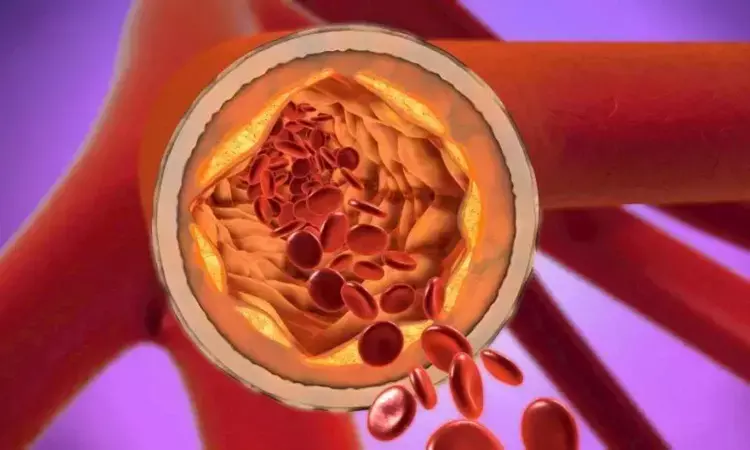- Home
- Medical news & Guidelines
- Anesthesiology
- Cardiology and CTVS
- Critical Care
- Dentistry
- Dermatology
- Diabetes and Endocrinology
- ENT
- Gastroenterology
- Medicine
- Nephrology
- Neurology
- Obstretics-Gynaecology
- Oncology
- Ophthalmology
- Orthopaedics
- Pediatrics-Neonatology
- Psychiatry
- Pulmonology
- Radiology
- Surgery
- Urology
- Laboratory Medicine
- Diet
- Nursing
- Paramedical
- Physiotherapy
- Health news
- Fact Check
- Bone Health Fact Check
- Brain Health Fact Check
- Cancer Related Fact Check
- Child Care Fact Check
- Dental and oral health fact check
- Diabetes and metabolic health fact check
- Diet and Nutrition Fact Check
- Eye and ENT Care Fact Check
- Fitness fact check
- Gut health fact check
- Heart health fact check
- Kidney health fact check
- Medical education fact check
- Men's health fact check
- Respiratory fact check
- Skin and hair care fact check
- Vaccine and Immunization fact check
- Women's health fact check
- AYUSH
- State News
- Andaman and Nicobar Islands
- Andhra Pradesh
- Arunachal Pradesh
- Assam
- Bihar
- Chandigarh
- Chattisgarh
- Dadra and Nagar Haveli
- Daman and Diu
- Delhi
- Goa
- Gujarat
- Haryana
- Himachal Pradesh
- Jammu & Kashmir
- Jharkhand
- Karnataka
- Kerala
- Ladakh
- Lakshadweep
- Madhya Pradesh
- Maharashtra
- Manipur
- Meghalaya
- Mizoram
- Nagaland
- Odisha
- Puducherry
- Punjab
- Rajasthan
- Sikkim
- Tamil Nadu
- Telangana
- Tripura
- Uttar Pradesh
- Uttrakhand
- West Bengal
- Medical Education
- Industry
Abdominal obesity tied to more than 4-fold risk of coronary artery calcification in CKD patients: Study

Taiwan: A recent study revealed an increased odds of coronary artery calcification (CAC) with abdominal obesity (AO) and association of AO with a 4.4-fold increased risk of severe CAC in patients with chronic kidney disease (CKD). The findings were published online in Dove Press International Journal of Nephrology and Renovascular Disease.
In the large population-based study, the researchers observed close associations between CKD and abdominal obesity with increased risks of both positive CAC and severe CAC.
"Participants with CKD exhibited adjusted odds ratios (ORs) of 1.1 and 2.6 for positive CAC and severe CAC, respectively, and the participants with AO had adjusted ORs of 1.4 and 1.8 for positive CAC and severe CAC, respectively," the researchers reported.
"The combined effects of CKD and AO resulted in increased ORs of 2.4 and 4.4 for positive CAC and severe CAC, respectively."
An elevated CAC score indicates the increased presence of fibro-calcified lesions in the coronary arteries, resulting in increased vessel wall stiffness. Accordingly, the CAC score is regarded as a robust predictive marker of coronary artery disease (CAD) risk.
Cardiovascular disease is the main cause of mortality in CKD patients, with the risk exacerbated by metabolic disorders. Compared with body mass index (BMI), waist circumference (WC) has been suggested as a more effective indicator of abnormal visceral fat. However, the associations between CKD, abnormal WC, and cardiovascular disease (CVD) have not been studied well.
Although both CKD and abdominal obesity independently raise CAD incidence, the combined effects of CKD and AO on CAC remain uncertain. CKD. Accordingly, Peng-Tzu Liu and Jong-Dar Chen from the Department of Family Medicine, Shin Kong Wu Ho-Su Memorial Hospital, Taipei City, Taiwan, elucidated this association and highlighted the importance of waist circumference as a clinical parameter for assessing patients with pre-dialysis
For this purpose, they conducted a cross-sectional study in Taiwan from 2006 to 2016 comprising 10,342 participants undergoing self-paid health checkups at a single medical centre. Blood samples and physical examinations were taken to assess metabolic parameters, and the Chronic Kidney Disease Epidemiology Collaboration formula was used for evaluating renal function.
Coronary artery calcification scores were determined through coronary 256-slice multidetector computed tomography angiography, with a CAC score of >0 Agatston unit (AU) and ≥ 400 AU denoting positive CAC and severe CAC, respectively.
Sex-based comparisons were conducted between individuals with chronic kidney disease and those without CKD.
The study revealed the following findings:
- In the CKD group, both sexes exhibited significantly elevated levels of systolic blood pressure, haemoglobin A1c (HbA1c), and serum fasting blood glucose (FBG), as well as reduced serum high-density lipoprotein cholesterol.
- Examination of the associations of abnormal WC revealed that for both sexes, individuals with abdominal obesity were significantly older and had higher systolic/diastolic blood pressure, serum FBG, HbA1c, and lipid profiles compared with those without AO.
- Multiple logistic regression analysis revealed that CKD patients exhibited a more pronounced association with severe CAC scores, compared with AO patients (odds ratios [ORs]: 2.7 and 1.4, respectively).
- The combined effects of AO and CKD (AO[+]/CKD[+]) resulted in increased risks of positive CAC (OR: 2.4) and severe CAC (OR: 4.4).
To conclude, the study provides evidence for the combined effects of chronic kidney disease and abdominal obesity on CAC. The participants with both CKD and AO exhibited 2.4- and 4.4-fold increased risks of positive CAC and severe CAC, respectively.
"Accordingly, in clinical practice, increased attention should be paid to reduce AO for individuals with CKD," the researchers wrote.
Reference:
Liu PT, Chen JD. The Associations Between Abdominal Obesity and Coronary Artery Calcification in Chronic Kidney Disease Population. Int J Nephrol Renovasc Dis. 2024 Feb 1;17:39-45. doi: 10.2147/IJNRD.S446445. PMID: 38317662; PMCID: PMC10840527.
Dr Kamal Kant Kohli-MBBS, DTCD- a chest specialist with more than 30 years of practice and a flair for writing clinical articles, Dr Kamal Kant Kohli joined Medical Dialogues as a Chief Editor of Medical News. Besides writing articles, as an editor, he proofreads and verifies all the medical content published on Medical Dialogues including those coming from journals, studies,medical conferences,guidelines etc. Email: drkohli@medicaldialogues.in. Contact no. 011-43720751


